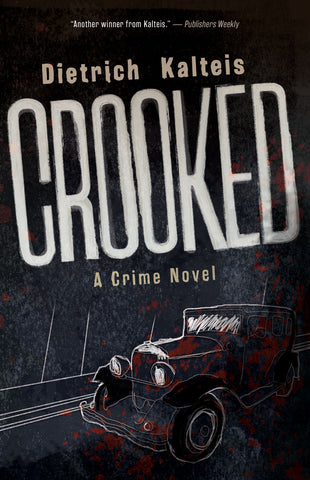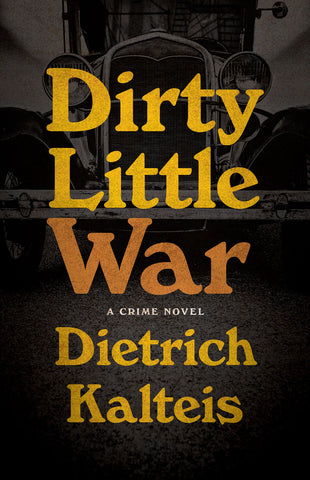How important is setting in your books? Do you write settings that you've never visited, and how do you go about this, if so? Give an example or two of setting in your own work and say how these scenes enhance the plot or create mood.
by Dietrich
Setting is the story’s anchor. A rich setting draws the readers in, grounding them in a time and place by adding color and tone to the story. It lends scope and adds to the pace and plot as well. It can be motivation for conflict, and it can act like an obstacle or an influence on the characters. And there are times when setting feels like a character itself.
Writing about places I haven’t been or times in which I haven’t lived means I have to sift through a lot of research to convince the reader of the story’s credibility. I need to immerse myself in the time and place until it feels like I’m right there — and all before I start to write word one. On top of visual descriptions, I need to draw on the senses of sound, smell, touch and taste to round it out.
To give an example, here’s part of the opening from my current novel Crooked. The idea here is to set time, place and mood while keeping the pace of the scene rolling forward.
“Was born in Montreal,” the old man said, taking the mint leaf from his glass, laying it down and sipping the drink, loving the taste, waiting politely as Graham tried to signal the elusive waiter, calling out, “Hey, señor! Por favor.” Snapping his fingers.
“You’re not in Mexico,” the old man said. “Here they go by camarero, and try perdone. And no snapping. You do, and they just let you sit, taking offense to it.” The old man mimicked snapping his fingers, his arthritis ebbing this past week. He’d been in a light mood, the sleeping pills and painkillers getting him through most nights, helping him feel less like a relic in these changing times of test-tube babies, man landing on Mars, and music he couldn’t begin to understand, one broad singing about “Hot Stuff,” another screeching about “Bad Girls,” then a guy who sounds like an emphysema case asking, “Do you think I’m sexy?” Plain awful, nothing like Glenn Miller or Kate Smith, or Jeanette doing “Porque Te Vas,” the local stations playing that one to death. He just hoped the medication wouldn’t disagree too much with the drinks.
Willing to talk about his past — those long-ago times when he topped Hoover’s most-wanted list — to anyone willing to cover the cost of a few rounds.
“You’re not in Mexico,” the old man said. “Here they go by camarero, and try perdone. And no snapping. You do, and they just let you sit, taking offense to it.” The old man mimicked snapping his fingers, his arthritis ebbing this past week. He’d been in a light mood, the sleeping pills and painkillers getting him through most nights, helping him feel less like a relic in these changing times of test-tube babies, man landing on Mars, and music he couldn’t begin to understand, one broad singing about “Hot Stuff,” another screeching about “Bad Girls,” then a guy who sounds like an emphysema case asking, “Do you think I’m sexy?” Plain awful, nothing like Glenn Miller or Kate Smith, or Jeanette doing “Porque Te Vas,” the local stations playing that one to death. He just hoped the medication wouldn’t disagree too much with the drinks.
Willing to talk about his past — those long-ago times when he topped Hoover’s most-wanted list — to anyone willing to cover the cost of a few rounds.
And here’s another example from my upcoming one, Dirty Little War — my main character’s impression upon arriving in 1920 Chicago for the first time, finding himself in an environment that feels like an antagonist at this point. I think the description lends a sense of authenticity and also give a sense of raised stakes.
Coming to town with less than ten bucks of his coming-north money left, enough to cover the rent for a couple of weeks, that is if he only ate once a day, this city having a way of scooping out a man’s pockets.
The wind chased in off the lake and it bit to the bone, but it was pushing back some of the reek from the Union Stockyards, its fetid ditch where the meatpackers dumped the eyeballs and bones that couldn’t be stuffed into the ballpark franks, the bubbly sludge and sewage draining into the ugly river flowing its way through town. Recalling something the slumlord said about the river being the prettiest you’d ever see, a kaleidoscope of sight and smell: green at the sausage factory, blue at the soap factory, yellow at the tannery — a sight you wouldn’t trade for anything on earth. Taking his hand from holding his collar closed against the wind, Huck covered his mouth and nose, moving faster along the tracks, the scraggly blades of grass wagging between the ties.
The wind chased in off the lake and it bit to the bone, but it was pushing back some of the reek from the Union Stockyards, its fetid ditch where the meatpackers dumped the eyeballs and bones that couldn’t be stuffed into the ballpark franks, the bubbly sludge and sewage draining into the ugly river flowing its way through town. Recalling something the slumlord said about the river being the prettiest you’d ever see, a kaleidoscope of sight and smell: green at the sausage factory, blue at the soap factory, yellow at the tannery — a sight you wouldn’t trade for anything on earth. Taking his hand from holding his collar closed against the wind, Huck covered his mouth and nose, moving faster along the tracks, the scraggly blades of grass wagging between the ties.



2 comments:
Lovely extracts from your writing, Dietrich - I especially enjoyed the way in which you weave sound (snapping fingers) and smell (holding his nose) in with the visual. When I'm writing, the non-visual parts of setting don't come to my mind first - I usually have to add them in at the second pass, when I'm editing and cleaning up stuff.
Thanks Harini. Me too, I'm always adding stuff on the second and even the third pass.
Post a Comment